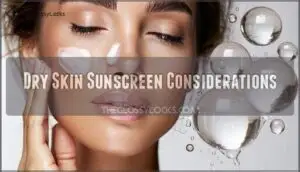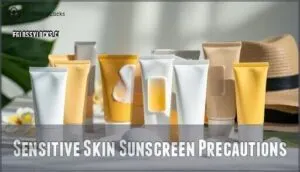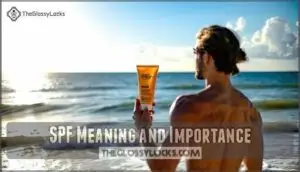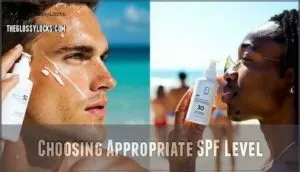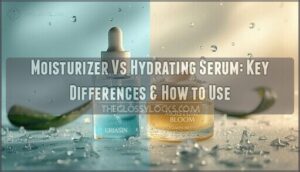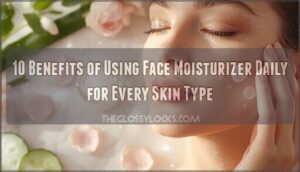This site is supported by our readers. We may earn a commission, at no cost to you, if you purchase through links.
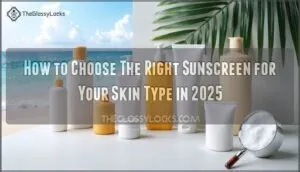
If you’ve got oily skin, look for lightweight, oil-free formulas that won’t clog pores.
Dry skin needs moisturizing ingredients like hyaluronic acid or ceramides.
Sensitive skin types should stick with mineral sunscreens containing zinc oxide or titanium dioxide, which are gentler than chemical alternatives.
Everyone needs broad-spectrum protection with at least SPF 30, but don’t fall for the myth that higher SPF means you can skip reapplication.
Water-resistant formulas work best for active lifestyles.
The texture matters too – creams for dry skin, gels for oily complexions, and sticks for targeted coverage.
Table Of Contents
- Key Takeaways
- Sunscreen Basics Explained
- Choosing Right Sunscreen Type
- Decoding SPF Levels
- Sunscreen Ingredients Matter
- Selecting Best Sunscreen Formula
- Frequently Asked Questions (FAQs)
- Which sunscreen is best for every skin type?
- How do I choose a sunscreen for my skin type?
- What is the best food for skin?
- How to choose the right sunscreen?
- How do dermatologists choose the best sunscreen?
- How do I know my skin type for sunscreen?
- How do I choose the right sunscreen?
- What kind of sunscreen is best for my skin?
- Which sunscreen should I use SPF 30 or 50?
- How long does sunscreen typically last after opening?
- Conclusion
Key Takeaways
- Match your skin type to formula: Choose oil-free gels if you have oily skin, moisturizing creams for dry skin, and mineral sunscreens with zinc oxide if you are dealing with sensitive skin.
- Don’t get fooled by high SPF numbers: You will get solid protection with SPF 30 (blocks 97% of rays), but you still need to reapply every two hours, regardless of whether it is SPF 30 or 100.
- Look for broad-spectrum protection: You need sunscreen that blocks both UVA and UVB rays – UVB prevents sunburn, while UVA prevents deeper skin damage and premature aging.
- Consider your lifestyle when choosing texture: Pick water-resistant formulas if you are active, stick sunscreens for targeted areas like your nose and ears, and lightweight textures if you will be wearing makeup over your sunscreen.
Sunscreen Basics Explained
Before you can pick the perfect sunscreen, you need to understand the basics that make sun protection actually work.
SPF numbers, broad-spectrum coverage, and water resistance aren’t just marketing terms—they’re your roadmap to safer skin.
What is SPF
SPF meaning is simple: it measures how long your skin can stay protected from UVB radiation without burning.
Think of it as your skin’s shield against sunburn. The American Academy of Dermatology recommends SPF 30 minimum, which blocks 97% of harmful rays.
Fair skin types need higher protection, often SPF 50, since they burn faster. Choose your sunscreen’s SPF level based on your skin type and sun exposure plans.
Many people are now opting for mineral based sunscreens to reduce skin irritation.
Broad Spectrum Protection
You need broad spectrum sunscreen for complete UV protection.
While UVB protection prevents sunburn, UVA protection stops deeper skin damage that causes wrinkles and aging.
Both rays increase cancer risk, so your daily sunscreen must shield against both.
Look for "broad spectrum" on labels to guarantee your sun protection covers the full UV spectrum for total skin safety.
Water Resistance and Reapplication
Despite what you might think, water-resistant sunscreen isn’t waterproof.
These formulas maintain protection for 40 to 80 minutes during swimming or sweating, depending on your activity levels and formula differences.
You’ll still need reapplication frequency every two hours, regardless of sweat impact.
Different skin types handle water resistance differently, so choose your sunscreen application method wisely.
Choosing Right Sunscreen Type
Finding the right sunscreen for your specific skin type makes all the difference between comfortable daily protection and a product that sits unused in your drawer.
Your skin’s unique characteristics—whether it’s oily, dry, sensitive, or somewhere in between—directly influence which formulation will work best and encourage consistent use, as the right choice can lead to comfortable daily protection.
Skin Types and Needs
Your skin type determines which sunscreen formula works best for you.
Different skin tones, sun sensitivity levels, age factors, skin conditions, and lifestyle factors all influence your sunscreen choice.
- Oily skin sunscreen needs oil-free, non-comedogenic formulas that won’t clog pores
- Dry skin sunscreen requires moisturizing ingredients like hyaluronic acid or glycerin
- Sensitive skin sunscreen works best with mineral-based zinc oxide or titanium dioxide
- Skin tone affects sun sensitivity, with lighter tones needing higher SPF protection
- Lifestyle factors like outdoor activities determine water-resistance requirements
Oily Skin Sunscreen Requirements
You’ll want oily skin sunscreen that won’t turn your face into a grease slick.
Non-comedogenic formulas prevent pore clogging while oil-free options control shine. Look for lightweight texture with matte finish to keep breakouts at bay.
Many people seek specific sunscreen products for this skin type.
| Feature | Why It Matters for Oily Skin |
|---|---|
| Non-comedogenic | Won’t clog pores or cause breakouts |
| Oil-free formula | Prevents excess shine and greasiness |
| Matte finish | Controls oil throughout the day |
| Lightweight texture | Feels comfortable, not heavy or sticky |
| Gel-based options | Absorbs quickly without residue |
Dry Skin Sunscreen Considerations
Many people with dry skin struggle to find sunscreen that doesn’t leave their face feeling tight or flaky.
Cream sunscreens with hydrating ingredients like hyaluronic acid and glycerin work best for your skin type.
These formulas help maintain your moisture barrier while providing sun protection.
Consider exploring options for specialized dry skin to find the perfect match.
Look for sunscreen sensitivity labels and apply frequently to prevent dryness from compromising your skin’s natural defenses.
Sensitive Skin Sunscreen Precautions
Why struggle with sunscreen that leaves your sensitive skin red and irritated?
Choose fragrance-free, hypoallergenic formulas with mineral ingredients like zinc oxide or titanium dioxide.
These gentle formulas minimize skin irritation and reduce allergy concerns.
Always perform patch testing before full application to check for ingredient sensitivity.
Avoid chemical sunscreens containing avobenzone or octocrylene, which commonly trigger skin allergies.
Prioritize irritation avoidance by selecting products specifically designed for skin sensitivity with mineral ingredients.
Decoding SPF Levels
You’ve probably seen SPF numbers ranging from 15 to 100+ on sunscreen bottles, but higher doesn’t always mean better protection.
Understanding what these numbers actually mean will help you choose the right level of sun protection for your skin type and daily activities.
SPF Meaning and Importance
SPF stands for Sun Protection Factor, measuring how long your skin stays protected from UVB radiation compared to unprotected skin.
Think of SPF as your skin’s personal bodyguard against sunburn.
Think of it as your sunscreen’s shield strength against sunburn prevention and skin cancer risks.
Higher SPF levels offer greater UV radiation defense, but the difference between SPF 30 and 50 isn’t as dramatic as you’d expect.
Understanding SPF duration helps you make smarter sun protection choices for preventing premature aging.
For swimming, it’s vital to account for water resistance of sunscreens to maintain continued protection.
Choosing Appropriate SPF Level
Your skin tone and activity level determine which SPF offers the best protection.
Fair skin requires SPF 50 or higher, while darker skin tones can use SPF 30.
Consider environmental factors like altitude and water reflection that intensify UV exposure.
For daily activities, SPF 30 provides adequate sun protection, but outdoor sports demand SPF 50 for enhanced efficacy and reduced reapplication frequency.
SPF Myths and Facts
Popular SPF misconceptions can mislead you about sunscreen effectiveness.
Higher SPF numbers don’t mean you can skip reapplication truths – even SPF 100 needs reapplying every two hours.
Broad-spectrum lies suggest any SPF protects against aging, but only labeled products block UVA rays.
Water resistance doesn’t equal waterproof, and high SPF won’t compensate for thin application or missed spots, highlighting the importance of proper sunscreen effectiveness.
Sunscreen Ingredients Matter
You’ll want to understand what’s actually in your sunscreen bottle, since not all ingredients are created equal.
The FDA has approved specific active ingredients for sun protection, but some chemicals raise safety concerns while natural alternatives offer gentler options for sensitive skin, and understanding these differences is crucial for making informed decisions about sun protection.
FDA-Approved Active Ingredients
Navigate through FDA regulations like a compass guiding your sunscreen choice.
The FDA approves sixteen active ingredients, divided into mineral blockers (zinc oxide, titanium dioxide) and chemical absorbers (avobenzone, octinoxate).
These FDA-approved chemical filters absorb UV rays, while mineral filters reflect them.
Hybrid formulas combine both types for enhanced ingredient safety and protection.
Some consumers also seek sunscreens with non toxic ingredients for overall skin health.
Potentially Harmful Chemicals to Watch For
Why should you care about what’s lurking in your sunscreen bottle? Some chemical sunscreen ingredients raise serious health concerns through chemical absorption into your bloodstream.
Your sunscreen’s ingredient list could be hiding chemicals that seep into your bloodstream.
Watch out for these problematic ingredients:
- Oxybenzone – Found in 97% of Americans’ bodies, this hormone disruptor can exceed FDA thresholds by 500 times after regular use
- Avobenzone – Breaks down under UV light creating free radicals that increase skin irritation and allergic reactions
- Octinoxate – Banned in Hawaii for harming coral reefs, also causes endocrine disruption and bioaccumulates in wildlife
Ongoing studies continue investigating these chemical absorption effects on human health. Certain preservatives, like Quaternium-15, are toxic.
Natural and Organic Sunscreen Options
Moving beyond chemicals that raise red flags, you’ll find mineral sunscreens with zinc oxide and titanium dioxide offer immediate protection without synthetic additives.
These reef-safe formulas work instantly, unlike chemical sunscreen options requiring absorption time.
Organic ingredients like coconut oil and shea butter provide natural efficacy while moisturizing your skin.
However, skip DIY sunscreen recipes—they’re unreliable and potentially dangerous for your skin type sunscreen needs.
Some natural ingredients, like carotenoid-rich carrot oil, can offer photoprotective properties.
Selecting Best Sunscreen Formula
Once you understand your skin’s unique needs, choosing the right sunscreen formula becomes much easier.
The texture and application method you select can make the difference between daily protection and a bottle that sits unused in your drawer, which affects your ability to apply daily protection.
Creams, Lotions, and Gels
Cream benefits shine through their rich, moisturizing formulas that create protective barriers on your skin.
Lotion absorption works faster than creams while offering lighter coverage. Gel texture feels weightless and won’t clog pores, making it perfect for oily complexions.
- Creams work best for dry skin types needing extra hydration and long-lasting protection
- Lotions blend easily into most skin types without leaving heavy residue or white streaks
- Gels absorb quickly and feel invisible, ideal for daily wear under makeup or alone
- Formulation stability varies between types – creams last longest while gels may separate faster
- Application differences matter – creams need more rubbing while gels spread effortlessly across skin
Sprays and Powders
Both spray sunscreen and powder sunscreen offer convenient portability factor for busy lifestyles.
Spray application provides quick coverage for hard-to-reach areas, while powder benefits include mess-free reapplication over makeup.
However, achieving even coverage requires proper technique—hold sprays close and rub in thoroughly.
Powder sunscreen excels in reapplication ease throughout the day, maintaining sunscreen consistency.
For daily use, consider options with broad-spectrum protection for everyday use, and prioritize sunscreen with these features.
Stick Sunscreens for Targeted Application
When you need precise application on hard-to-reach areas, stick sunscreen delivers mess-free coverage exactly where you want it.
This portable format excels for targeted protection without the hassle of traditional lotions.
- Precise Application: Perfect for lips, ears, nose, and around eyes
- Mess-Free Use: No spills or sticky hands during application
- Portability Factors: Fits easily in pockets, purses, or gym bags
- Kids Sunscreen: Ideal for squirmy children who hate traditional sunscreen application
Texture and Application Considerations
Beyond choosing the right formula, texture preferences and application techniques substantially impact your sunscreen’s effectiveness.
Some people prefer lightweight, silky textures that absorb quickly, while others favor richer creams for extra moisture.
Consider your skin type when evaluating formula feel – oily skin benefits from gel-based options, while dry skin needs creamier textures.
Proper sunscreen layering and reapplication reminders guarantee continuous protection throughout your day.
Frequently Asked Questions (FAQs)
Which sunscreen is best for every skin type?
One size doesn’t fit all when choosing sunscreen. You’ll want broad-spectrum SPF 30+ for basic coverage, but oily skin needs oil-free formulas while dry skin benefits from moisturizing creams.
How do I choose a sunscreen for my skin type?
Match your sunscreen to your skin’s needs: oily skin requires oil-free, non-comedogenic formulas; dry skin benefits from moisturizing creams; sensitive skin needs mineral sunscreens with zinc oxide.
What is the best food for skin?
Your skin’s ultimate superfuel comes from colorful fruits and vegetables packed with skin-boosting antioxidants.
You’ll get vitamin C from citrus, vitamin E from nuts, and omega-3s from fatty fish for that healthy glow.
How to choose the right sunscreen?
Choose SPF 30+ broad-spectrum sunscreen based on your skin’s needs: mineral formulas for sensitive skin, oil-free for acne-prone, and moisturizing types for dry skin.
How do dermatologists choose the best sunscreen?
Ironically, dermatologists don’t have secret formulas—they follow the same basic rules you should.
They prioritize broad-spectrum protection with SPF 30-50, match formulation to skin type, and emphasize consistent daily use over fancy ingredients.
How do I know my skin type for sunscreen?
Check your skin’s reaction to sun exposure.
Oily skin feels greasy and may break out with heavy products.
Dry skin feels tight and flaky.
Sensitive skin burns or irritates easily, requiring gentle formulas.
How do I choose the right sunscreen?
When Sarah’s oily skin broke out from thick sunscreen, she switched to gel formulas.
You’ll want SPF 30+ broad-spectrum protection, then match formulation to your skin type: gel for oily skin, cream for dry skin, mineral for sensitive skin.
What kind of sunscreen is best for my skin?
Your skin type determines your ideal sunscreen formula.
Oily skin needs oil-free, non-comedogenic gels.
Dry skin benefits from moisturizing creams with hydrating ingredients.
Sensitive skin requires mineral formulas with zinc oxide or titanium dioxide for gentler protection.
Which sunscreen should I use SPF 30 or 50?
For most people, SPF 30 works fine for daily wear, blocking 97% of harmful rays. Choose SPF 50 if you’re fair-skinned, spend extended time outdoors, or have higher skin cancer risk.
How long does sunscreen typically last after opening?
Most sunscreens last two to three years after opening, but you’ll want to replace them annually for best protection. Heat and sunlight can break down active ingredients faster.
Conclusion
Finding your perfect sunscreen match doesn’t require endless trial and error—just smart choices based on your skin’s unique needs.
Remember, knowing how to choose the right sunscreen for your skin type comes down to matching formulation with function.
Whether you’re dealing with oily, dry, or sensitive skin, the right combination of SPF level, ingredients, and texture will keep you protected without compromise.
Your skin deserves consistent, effective protection that works with your lifestyle, not against it.
- https://www.aad.org/public/everyday-care/sun-protection/shade-clothing-sunscreen/how-to-select-sunscreen
- https://www.skincancer.org/blog/ask-the-expert-does-a-high-spf-protect-my-skin-better/
- https://bluelizardsunscreen.com/products/sensitive-mineral-sunscreen-lotion-spf-50
- https://www.bu.edu/articles/2021/how-to-choose-face-sunscreen-dermatologist-tips/
- https://progressreport.cancer.gov/prevention/sun/sun_protection



